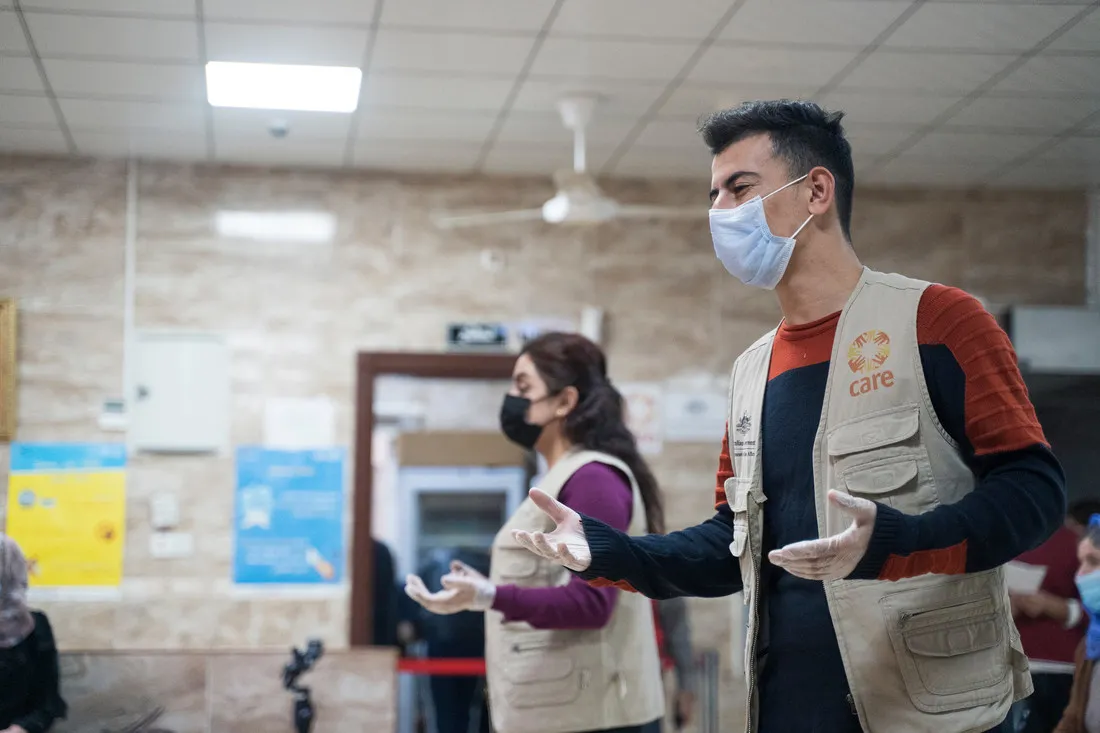Since they began testing in 2021, CARE Iraq has learned many best practices that drive change using social media, from connecting with people’s values to reinforcing social norms.
From June 13 to July 18 in 2022, CARE Iraq and 15 other countries ran online ad campaigns promoting COVID-19 preventive practices and messaging designed to boost COVID-19 vaccine and booster confidence. Iraq had been struggling with low vaccination rates across the country, with NPR reporting that in February 2022, only 17% of Iraqis had been fully vaccinated. As of May 2022, a cumulative 18.3 million vaccine doses had been administered countrywide, with only 182,526 individuals having received their third dose of the vaccine.
CARE Iraq launched a series of video ads that encouraged people to get their COVID-19 vaccines and boosters specifically to continue living a normal life. This campaign supported offline public health programs the CARE Iraq country office conducted, including in-person COVID-19 vaccination awareness sessions and a mobile vaccination unit in Mosul City, Iraq.
TL;DR summary
- CARE Iraq’s summer campaign delivered exceptional results, likely influencing an additional 314,932 people’s attitude that the COVID-19 vaccine was safe and important.
- Purposeful design and application of best practices in creative ideation led to 1.6 million people engaging with the campaign’s ads through likes, clicks, shares, and comments.
- Learnings from past campaigns were replicated as videos featuring real people outperformed motion graphics.
Creative and best practices
CARE Iraq’s campaign consisted of five video ads, each ranging from 20 to 60 seconds and using both real and animated images. Building upon their best practice learnings, which showed that videos featuring real people performed better in both driving engagement and shifting knowledge, attitude, and behavior, four out of the five videos CARE Iraq ran featured real people: a chef, taxi driver, teacher, and doctor. These well-designed ads leveraged messaging best practices from UNICEF’s vaccine messaging guide and delivered some of the strongest results across all country office campaigns.
UNICEF vaccine messaging best practices:
- Building trust using trusted and relatable messengers
- Balancing messaging since pro-vaccine messaging can backfire
- Reminding people why we vaccinate
CARE Iraq’s Communications Officer Huda Ali, who spearheaded campaign design, spoke about the purposeful intent behind the creative messaging. “The most important thing is for people to know that they are not being ordered to do this or being told this is the right way,” she said. Instead, the purpose is for people to see regular members of their community experience a sense of normalcy and safety after having received the vaccine or booster. In other words, using pro social norming was the most approachable and appropriate messaging method in Iraq.
CARE Iraq chose to feature people from different walks of life in their ads since the campaign was “addressing all types of people in different communities.” Being able to see a chef from a well-known restaurant that people have been to or a doctor who people rely on for medical guidance created a sense of relatability and connection.
Results
Top performing ads
Videos that featured real and relatable people continued to be top performers in this campaign, with the video featuring the chef being the most engaging and widely viewed (23 million views). The video with the taxi driver generated a very high clickthrough rate of 0.42%, double the expected platform benchmark of 0.20%.
View this post on Instagram

